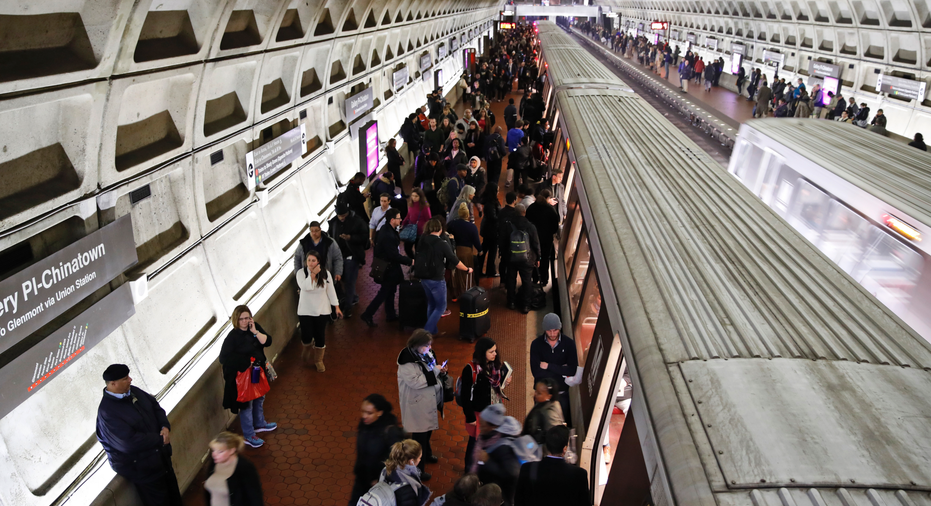Weekend derailment is latest black eye for DC subway system

WASHINGTON – A derailment over the Martin Luther King Jr. holiday weekend is only the latest problem for the dysfunctional D.C. subway system that Washingtonians love to hate.
Metro's problems are familiar to subway riders in New York and other big cities: smoke-filled tunnels, technical failures, delays and more. But Washington isn't just any American city. The Metro, once a jewel of the city, is critical for making the nation's capital work. Washington City Councilman Jack Evans, who serves as chairman of the Metro board, cites studies showing 42 percent of federal government workers take public transit regularly.
Metro's odd funding structure makes it harder to fix the system. Washington's trains extend into Virginia and Maryland, pulling in three bureaucracies in an unwieldy arrangement with officials who are reluctant to tax voters to subsidize the system.
So Metro riders can do little more than fume about bad service and consider other travel options.
"There's only so many times I can blame the trains for being late to work or an appointment," said Susan Thomas, an accountant waiting to take the Orange Line downtown from East Falls Church in Virginia. "Now it's not really that much cheaper than the Uber or Lyft pool options, and with that I get more reliability and door-to-door service."
More than a decade of problems have spawned a thriving online community of websites and social media accounts dedicated to chronicling and mocking Metro's failings.
The situation is so bad that Metro officials have had little choice but to admit the scope of the problem and try to regain riders' trust. Just over a year ago, Metro launched a comprehensive reform and repair campaign called "Back2Good."
Since then, Evans said, things have gotten better. "We've stopped the freefall," he said.
To a large extent that's true — but with an asterisk. The most recent statistics show reductions in accidents, smoke incidents and delays. However, the Metro is also running fewer trains with longer waiting times in between. Put simply, it's easier to have fewer problems when you're offering less service.
The latest black eye happened early Monday when a train derailed just blocks from the White House. Because of the holiday, only 60 passengers were aboard, and no one was seriously injured. But it caused delays that extended into the Tuesday morning rush hour.
Unlike subways in New York and elsewhere, Washington's wasn't built with extra tracks to keep the trains rolling while repairs or maintenance are underway. The multiple jurisdictions involved in the Metro make its situation especially vexing.
"We've got a transit system that's falling apart, and we've got three states involved, and the decision-making in the three states is not clear," said Washington City Council President Phil Mendelson. "We're in a real impasse in the region, and it's very unfortunate."
A 2017 study by former U.S. Transportation Secretary Ray LaHood recommended scrapping Metro's 16-member executive board in favor of a temporary five-member emergency body.
Evans disputes the idea that the Metro board is unfixable. Instead of focusing on the board, Evans says, the real emergency need is a radical transformation of Metro's finances.
Evans and Mendelson are pushing for a dedicated funding stream through a new 0.75-cent regional sales tax, which would raise an estimated $500 million a year. Such tax-based metro funding arrangements are common in New York, Chicago and elsewhere. Evans said the dedicated and reliable funding stream would enable the Metro board to sell bonds that could raise up to $15 billion over 10 years to fund massive capital improvements.
However, there are a half dozen other plans with different taxes and different board restructuring proposals being floated, and few signs of consensus. Evans said he had hoped LaHood would break the multidirectional deadlock by endorsing a specific type of dedicated funding, but the report didn't back any specific plan.
"No one will step up and say, 'This needs to be done.' There's no political courage in dealing with Metro," Evans said. "I think we're stuck."
For now, disgruntled commuters will keep staggering along, with Metro Twitter ready to pounce on any missteps.
When Metro closed a three-station stretch of the Maryland-D.C. Red Line in late November for repairs, it arranged for buses to transport riders over the shuttered section. The first morning, there weren't enough buses to meet the demand, and pictures of long lines outside the Silver Spring, Maryland, station spread far and wide.
One unsatisfied customer was lawyer Aaron Schwartz, who characterized the Metro system as a permanent black mark holding Washington back from its own metropolitan ambitions.
"The part that amuses me is that the District government is so eager to have Washington labeled a world-class city. ... They're trying to get Amazon to open a massive East Coast headquarters here," he said. "Can you imagine (Amazon and Washington Post owner) Jeff Bezos reading all these stories about the Metro and deciding to set up shop in Washington? It's ridiculous."
Behind him were other commuters, who saw the line and began pulling out their phones to order cars.
___
This story has been corrected to show that the proposed regional sales tax is 0.75 cents, not 75 cents.



















